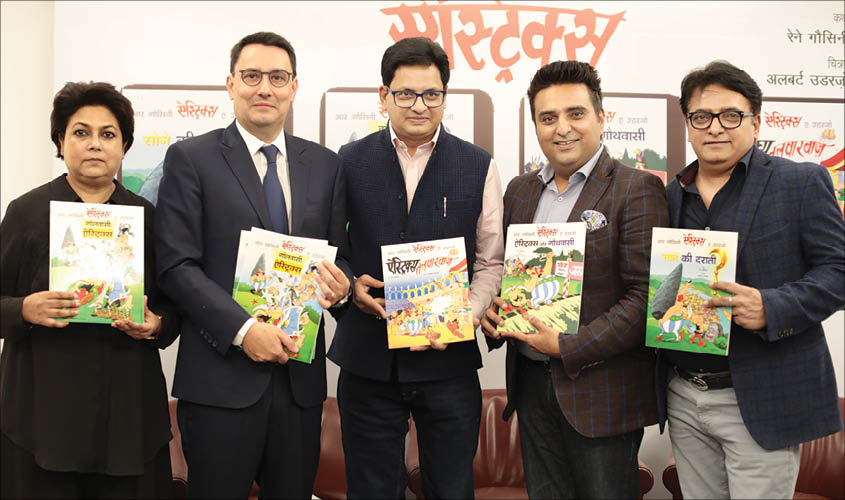French comics Astérix is one of the best-selling comic book series in the world. It has been published in 111 languages and dialects until now, selling over 375 million copies worldwide. On 27 March, the first four albums of the Astérix series were launched for the first time in a Hindi translation. Astérix in Hindi was jointly released by the Ambassador of France to India, Alexandre Ziegler, and publisher Ajay Mago, at an event in Chanakyapuri, New Delhi.
The albums have been translated by Dipa Chaudhuri, Chief Editor, Om Books International, and Puneet Gupta, an advertising professional who writes science fiction novels, short stories and humorous poetry.
These satirical comics focus on the adventures of the protagonists Astérix and Obelix, who hail from the village Gaul. The story begins with these characters fending off Roman offensives in BC 50 with the help of a magic potion brewed by the venerable village druid. The potion temporarily imparts them with superhuman strength, which adds to their adventures.
The first four albums are entitled in Hindi Gaulwasi Astérix, Sone ki Darati, Astérix Aur Gawthwasi and Astérix Talwarbaz. Welcoming the publication, Ambassador Alexandre Ziegler said, “Astérix’s strength is his ability to please and renew his audience, generation after generation. The characters embodying French spirit are timeless and such a significant part of French heritage. Their stories are an opportunity for readers to get a glimpse of the history of the country of the characters’ origin. Making the humour and stories accessible in another language and culture is no mean feat, so I warmly congratulate the translators for taking up this challenge.”
The series, popularly known as The Adventures of Astérix, was written by René Goscinny and illustrated by Albert Uderzo. It first appeared in a Franco-Belgian comics magazine, Pilote, on 29 October 1959. Soon after, the comics became a rage across Europe and was translated into multiple languages.
Ajay Mago, Publisher, Om Books International, said, “I have grown up devouring Astérix comics. And I was amazed at the amount of cultural history that these comics are replete with. Every character has been so carefully crafted. Every dialogue has layers of meanings. It was back then that I had decided that, someday, I would love a Hindi edition of this series.”
It was Ajay Mago who acquired the Hindi translation rights of The Adventures of Astérix from Hachette Livres, France after nearly five years of prolonged and sustained negotiations, which started in 2009 with a blind call at an international book fair. He just walked into the Hachette Livre stand, hoping to get the Hindi rights for Astérix, which were finally acquired in 2014.
Dipa Chaudhuri, co-translater, told us about the approach she took while translating the comics: “The idea was never to ‘convert’ the comics by translating them into Hindi. We wanted the Hindi translatation to be just as competent as the translations of French, Italian and Russian literary masterpieces into English or other languages. The translations should ‘communicate’ the narratives instead of ‘converting’ or ‘customising’ them to the cultural construct of the language they are translated into. Also, the imposing visuals of Astérix would make it near impossible to ‘Indianise’ the comics. The comics are being translated with the desire to share a cultural experience that is quite unique, different, yet not dissimilar in the gamut of human experiences.”
India has had a very strong comic-book tradition, not only in English and Hindi, but in several regional languages as well. There is already a huge readership of Astérix in English in India. Chaudhuri said, “Astérix in Hindi is not only for the strictly Hindi-phone readers, but for comic buffs and collectors, artists, ethnographers, educational institutions, across linguistic boundaries and across India and the world.”
Today, Astérix enjoys appreciation from readers around the globe, and has several film adaptations to its name.
Apart from this, many popular games, too, have been launched based on Astérix characters. Another interesting addition to the Astérix universe is the theme park near Paris, Parc Astérix. In fact, the very first French satellite, launched in 1965 was named after Astérix as well. Clearly, the comic series has become an international phenomenon that has few parallels.
Talking about the challenges encountered in bringing out the albums in Hindi, Dipa Chaudhuri said, “Translating comics have practical constraints. The first and immediate constraint is fitting the Hindi translations from French into each speech blurbs, despite Hindi being syntactically longer than French because of the accents on the top, bottom and the side. While the French comics are hand-written, we had to look for a similar typeface in Hindi that could be typed out on the keyboard. At times, we needed to choose different fonts that would establish the distinct accent with which a Goth would speak for instance. Apart from Astérix and Obelix, whose names remain unchanged, renaming the characters, designations, geographical coordinates was an exciting exercise as each name in French and in Hindi has multiple meanings.”
Also, each language has a set of distinct sounds that are associated with gestures and actions. The translators had to work their way through the sounds from French into Hindi. Chaudhuri further explained, “Many frames had to be redrawn with Hindi words as these were for pure visual effect and did not have speech blurbs. In fact, we were translating not only from French into Hindi, but depending on the provenance of the protagonist, we were translating from Latin, and on occasion, from German too. Negotiating between different registers of each language to establish the social hierarchy within which the characters were situated, was clearly part of the task at hand.”
Having finished the first four albums, the translators are now busy working on the subsequent albums of Astérix comics which, too, will soon be available in Hindi.

